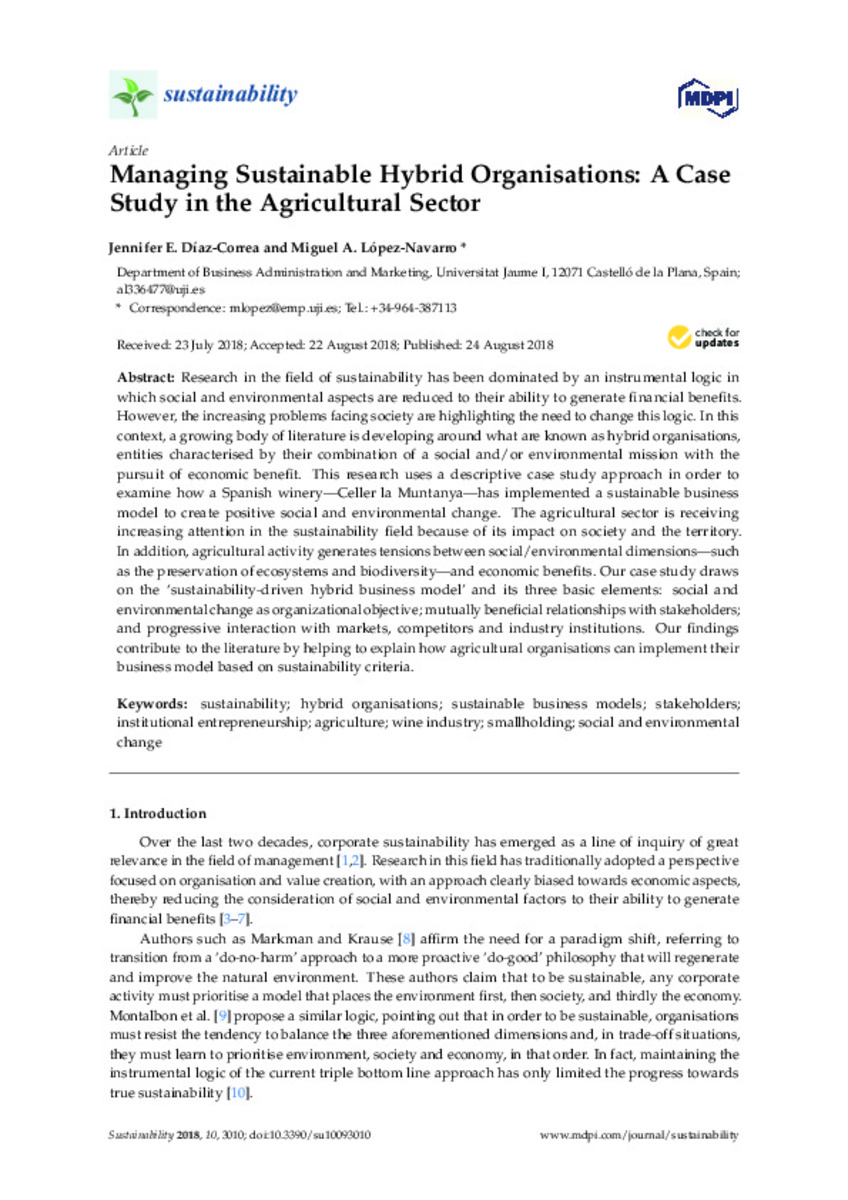Mostrar el registro sencillo del ítem
Managing Sustainable Hybrid Organisations: A Case Study in the Agricultural Sector
| dc.contributor.author | Díaz Correa, Jennifer Elena | |
| dc.contributor.author | López-Navarro, Miguel Ángel | |
| dc.date.accessioned | 2018-11-23T18:25:12Z | |
| dc.date.available | 2018-11-23T18:25:12Z | |
| dc.date.issued | 2018 | |
| dc.identifier.citation | Díaz-Correa, Jennifer, and Miguel López-Navarro. "Managing Sustainable Hybrid Organisations: A Case Study in the Agricultural Sector." Sustainability 10.9 (2018): 3010 | ca_CA |
| dc.identifier.issn | 2071-1050 | |
| dc.identifier.uri | http://hdl.handle.net/10234/177646 | |
| dc.description.abstract | Research in the field of sustainability has been dominated by an instrumental logic in which social and environmental aspects are reduced to their ability to generate financial benefits. However, the increasing problems facing society are highlighting the need to change this logic. In this context, a growing body of literature is developing around what are known as hybrid organisations, entities characterised by their combination of a social and/or environmental mission with the pursuit of economic benefit. This research uses a descriptive case study approach in order to examine how a Spanish winery—Celler la Muntanya—has implemented a sustainable business model to create positive social and environmental change. The agricultural sector is receiving increasing attention in the sustainability field because of its impact on society and the territory. In addition, agricultural activity generates tensions between social/environmental dimensions—such as the preservation of ecosystems and biodiversity—and economic benefits. Our case study draws on the ‘sustainability-driven hybrid business model’ and its three basic elements: social and environmental change as organizational objective; mutually beneficial relationships with stakeholders; and progressive interaction with markets, competitors and industry institutions. Our findings contribute to the literature by helping to explain how agricultural organisations can implement their business model based on sustainability criteria. | ca_CA |
| dc.format.extent | 17 p. | ca_CA |
| dc.format.mimetype | application/pdf | ca_CA |
| dc.language.iso | eng | ca_CA |
| dc.publisher | MDPI | ca_CA |
| dc.relation.isPartOf | Sustainability, 2018, vol,10, núm. 9 | ca_CA |
| dc.rights | © 2018 by the authors. Licensee MDPI, Basel, Switzerland. This article is an open access article distributed under the terms and conditions of the Creative Commons Attribution (CC BY) license (http://creativecommons.org/licenses/by/4.0/). | ca_CA |
| dc.rights | Atribución 4.0 Internacional | * |
| dc.rights.uri | http://creativecommons.org/licenses/by-sa/4.0/ | * |
| dc.subject | sustainability | ca_CA |
| dc.subject | hybrid organisations | ca_CA |
| dc.subject | sustainable business models | ca_CA |
| dc.subject | stakeholders | ca_CA |
| dc.subject | institutional entrepreneurship | ca_CA |
| dc.subject | agriculture | ca_CA |
| dc.subject | wine industry | ca_CA |
| dc.subject | smallholding | ca_CA |
| dc.subject | social and environmental change | ca_CA |
| dc.title | Managing Sustainable Hybrid Organisations: A Case Study in the Agricultural Sector | ca_CA |
| dc.type | info:eu-repo/semantics/article | ca_CA |
| dc.identifier.doi | https://doi.org/10.3390/su10093010 | |
| dc.rights.accessRights | info:eu-repo/semantics/openAccess | ca_CA |
| dc.relation.publisherVersion | https://www.mdpi.com/2071-1050/10/9/3010 | ca_CA |
| dc.type.version | info:eu-repo/semantics/publishedVersion | ca_CA |
Ficheros en el ítem
Este ítem aparece en la(s) siguiente(s) colección(ones)
-
EMP_Articles [451]
Excepto si se señala otra cosa, la licencia del ítem se describe como: © 2018 by the authors. Licensee MDPI, Basel, Switzerland. This article is an open access
article distributed under the terms and conditions of the Creative Commons Attribution
(CC BY) license (http://creativecommons.org/licenses/by/4.0/).








